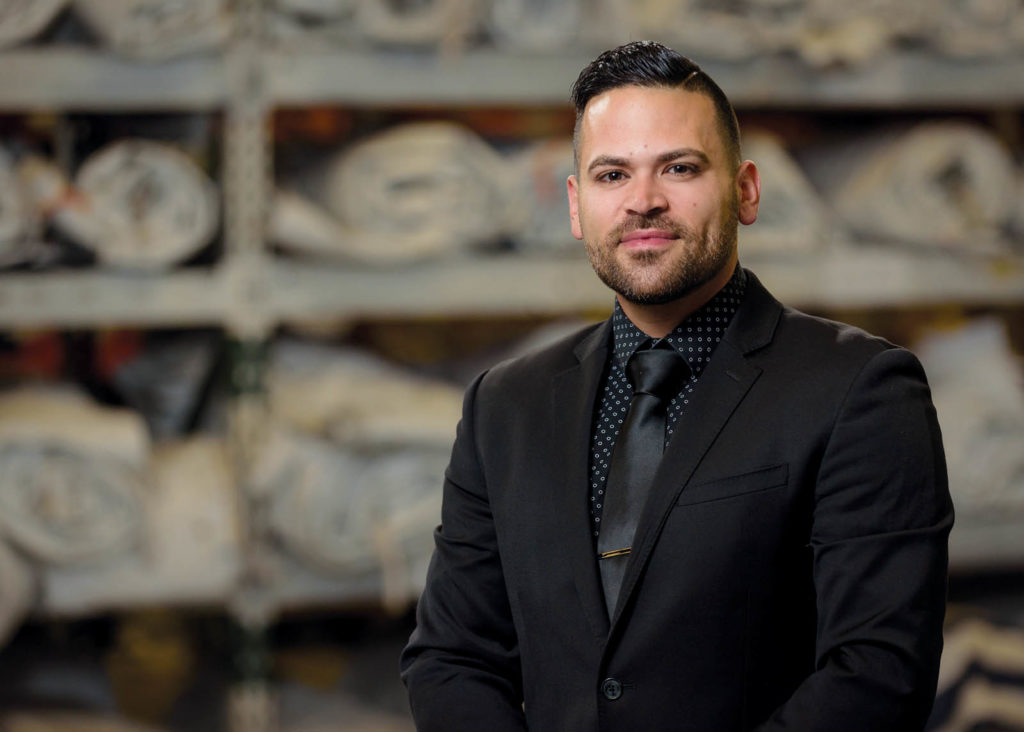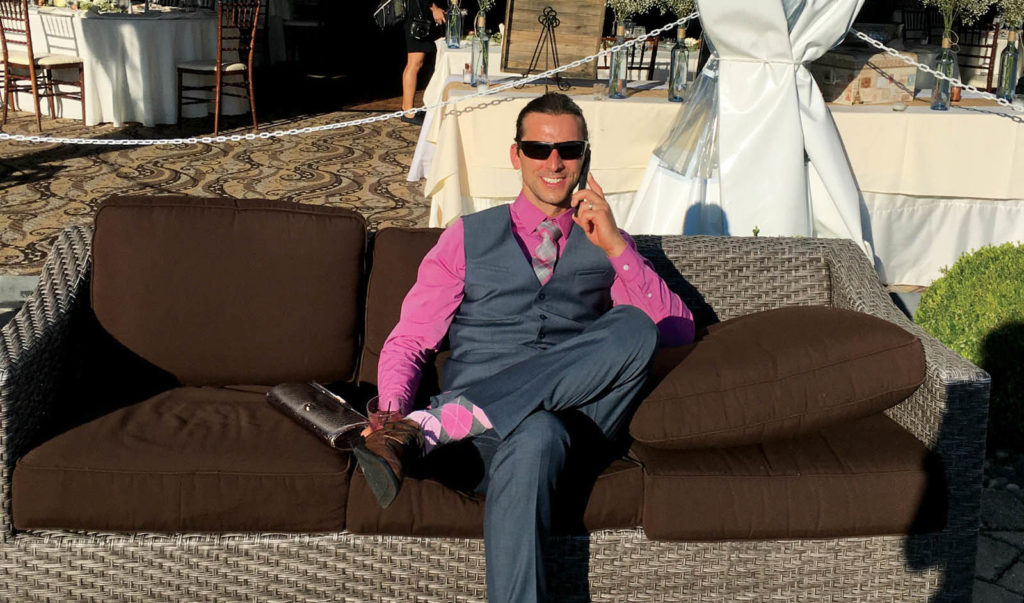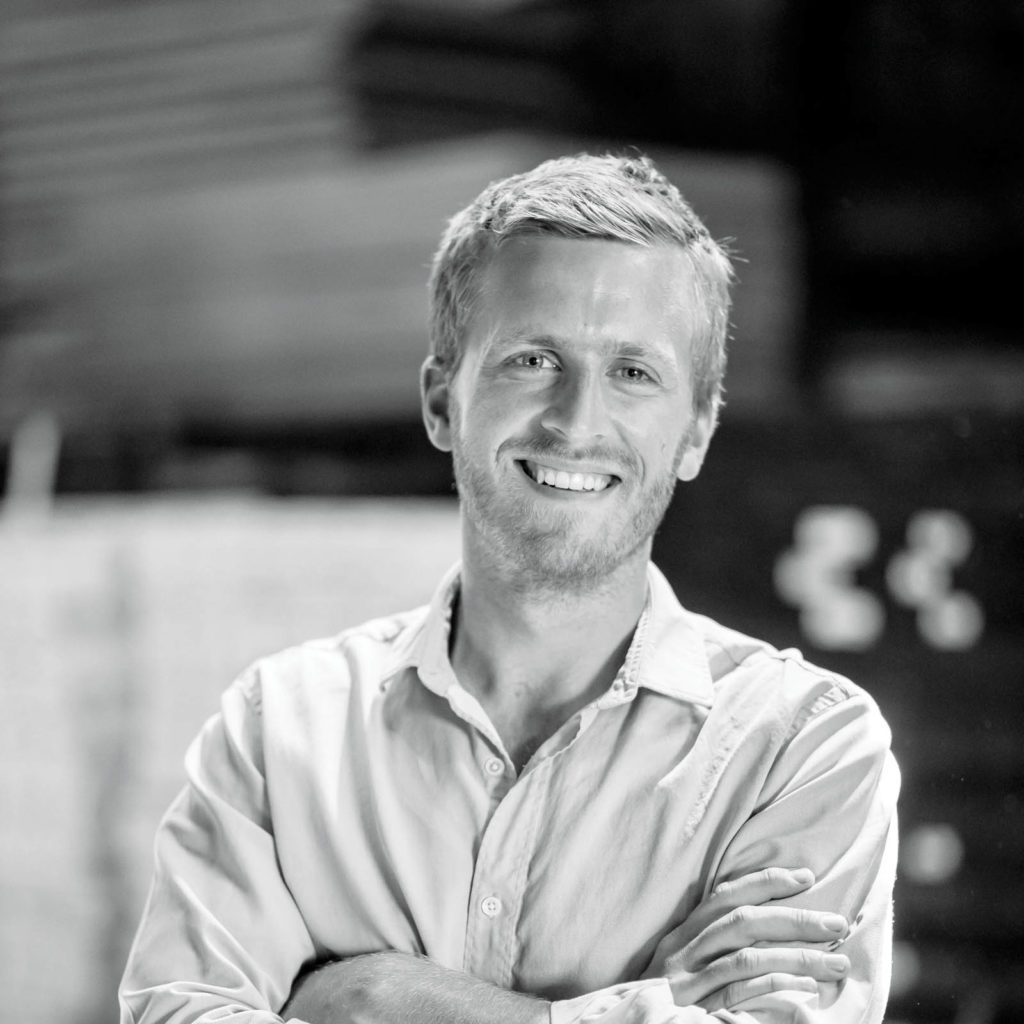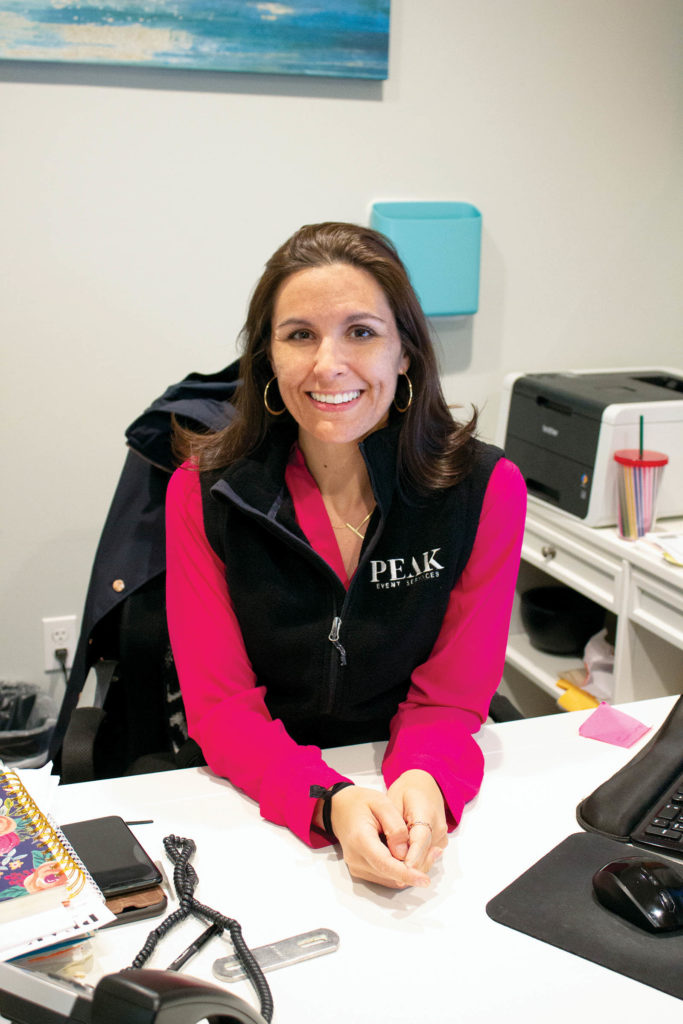Meet five young professionals who are working toward a vibrant and forward-thinking tenting industry.
by Sigrid Tornquist
Tent Expo 2019 in January kicked off with a young professionals happy hour, where Ramsey Duqum, CEO of AAble Rents, gave a spirited message to those gathered about advancing the tent rental industry.
To continue that energy, InTents is for the first time honoring five industry professionals under age 40 who are making a name for themselves and their companies.
Each individual’s path is unique: Duqum took over a family business. Sean McCarthy and Zachary Wilson started working on installations crews; McCarthy eventually launched his own company and Wilson purchased an existing business. Tarryn Prosper joined a regional powerhouse after being exposed to tents through other facets of the event industry. In joining his father’s profession, Walberto Vasquez shows that when one door closes, another door opens. But they all have traits in common, besides their youth: they have a vision for their company and the industry as a whole, and in one way or another, they fell in love with tents.
Do you know a young professional we should keep our eye on? Nominate that person for the 2020 InTents “5 under 40” by emailing editor Jill C. Lafferty at jclafferty@ifai.com.

Ramsey Duqum, CEO and co-owner AAble Rents
Cleveland, Ohio
www.aablerents.com
Employs 36 full-time and 80 seasonally
Ramsey Duqum, CEO and co-owner, AAble Rents, Cleveland, Ohio, first “punched in” at AAble Rents when he was five years old. He and 22 cousins spent their days in a daycare funded by AAble Rents behind the original store. “Punching in meant going to our grandmother’s desk and saying we were here to work, washing some chairs, and going back to her desk, where we would get paid in pop money,” he says.
After years of working seasonally at AAble Rents, Duqum began exploring his dream of pursuing a career in indoor skydiving. But in 2006 his grandmother asked him to take over as operations manager at AAble Rents. “The company was 60 days away from insolvency,” he says. “It was difficult, but I had a vision to re-shape AAble Rents from a festival, low-cost provider, into a high-end tent and flooring provider. I guess I was too naïve to know how much responsibility I was taking on.”
Duqum cleaned house and began to turn the company around. In 2012 he and his brother Brandon (who is CFO) purchased the company that now provides high-end tenting and flooring, as well as traditional tables and chairs. “Tenting and flooring is the hardest niche in the event rental industry,” he says. “We’re doubling down on our efforts through using mechanization, technology and human resource.
“I think it is an inevitability that companies like ours mechanize,” Duqum continues. “We haveinvested a considerable amount of money in systems, machines and materials handling.”
Duqum and his brother have rebuilt the company by focusing on standardizing systems and processes that have led to successful, replicable outcomes. “In my opinion, this is the key to running and owning a successful tent rental company,” he says.
On the tenting side, AAble Rents is constantly looking for new ways to standardize designs. “We were the first in the country to take an Event Series clearspan, which is normally made for 20 and 25 meters, and have it cut down, but with all the same legs, cables, wall systems and rafters,” he says. “We also designed and manufactured a compression-loaded, engineered, wooden laminate center pole. These center poles are primarily used for the sailcloth market. We ship them throughout the country to other quality rental providers.”
AAble Rents also recently worked with a manufacturer to develop a modular wall for pole and frame tents. The idea is based on a rollup sailcloth wall that straps to the legs. “We call it our Premier Wall,” he says. “It has similar benefits to a kedered wall system but installs much quicker.”
Modular designs benefit both the company and the clients, Duqum says—and that efficiency keeps clients coming back for more.
(Q) How can tent and event industry members keep moving the industry forward?
(A) When I go to IFAI [shows] I enjoy getting to know the vendors equally as much as the attendees. Over the years I’ve been labeled a challenging client in the vendors’ circle because we’re challenging the way they do things. Getting together at the shows provides this wonderful ability to get all of these minds in one area so we can share ideas and keep pushing the envelope.

Sean McCarthy, owner, McCarthy Tents & Events
Rochester and Buffalo, N.Y.
www.mccarthyevents.com
Employs: 25 full-time and 25 to 40 seasonally
Sean McCarthy, owner of McCarthy Tents & Events, Rochester, N.Y., entered the tent and event rental industry as many people do—by working on an installation crew as a summer job. “I didn’t think much about it at the time, but I fell in love with it,” he says. “One summer became another and another during college. Post-college I worked for other tent companies before deciding that I could own my own company, make more money and run it better.”
In 2008 McCarthy Tents & Events was up and running. “My first delivery was 25 black folding chairs to a Chinese restaurant on New Year’s Eve,” McCarthy says. “I delivered them to the kitchen and vowed that I would never eat at that restaurant again.”
McCarthy Tents & Events now has two locations and provides tents for small backyard parties, large structures for corporate events and festivals, and pretty much everything in between. In its first years, McCarthy grew the company exponentially. “Our first goal was to get to a million dollars, which we did,” he says. “Then we grew to a much higher revenue.”
For anyone still in a rapid growth mode, McCarthy cautions “not to over-focus on growing the revenue number unless it means something,” he says. “You can go from three million to four million but at the end of the day, if it doesn’t make the company more money, it’s just feeding the machine—and you have to ask yourself if that’s really worth it.”
Now, after about a decade of rapid growth, McCarthy’s goal is more incremental—he wants to keep the growth between 5 and 10 percent a year. “We’re happy with where we are and now are more focused on fine tuning the way we operate—safety, efficiency and keeping the customers we have are our priorities,” he says. “My big thing is—and I point this out to my sales staff—now that we’re on top, it’s the fight to stay on top.”
For McCarthy, part of staying on top is keeping clients’ trust and not giving them a reason to go elsewhere. “Customers are finicky—and as a customer, I’m finicky too,” he says. “If people start to feel like you’re complacent after a while, they’ll want to shop around. You’ve got to continue to be as awesome as you were when you were only doing half a million a year.”
Connections with clients are a top priority for McCarthy, no matter how busy he is. “I get out on the road, so I get to know our customers,” he says. “People think I’m crazy, but I’m pretty much on the road from early May to October every year. It’s a way for me to stay connected with the regular customers and get to know new customers we’re trying to impress.”
(Q) What advice would you give someone new to running a tent and event rental company?
(A) Don’t go the cheap route just because you don’t have much revenue. You’ll end up regretting it—and those items will end up being the black sheep of your inventory. If there’s a higher-end product you want, find a way to make it work. You can’t be afraid of risk or debt. If you’re going to be a relevant force, you’re going to have to spend some money.
Tarryn Prosper, director of tent sales, PEAK Event Services
Woburn, Mass.
www.PEAKeventservices.com
Employs 400 full-time and 300 seasonally
Tarryn Prosper, director of tent sales, PEAK Event Services, Woburn, Mass., likes to joke that she started in the tent industry as a child because she was obsessed with building things, particularly with K’NEX building sets. More officially, she entered the industry in 2008, before working at an event planning company in Boston in 2011.
“As a part of my job at the event planning company, I worked with Peterson Party Center [now PEAK Event Services] on many tent-related projects,” she says. “I absolutely loved working on tent projects, and when it became possible for me to move over to the tent side of the business, I jumped at the opportunity.”
For the past three and a half years, Prosper has managed the tent rental division at PEAK Event Services, which includes managing a team of seasoned tent sales consultants. “My team manages the relationship from first phone call all the way through to the final invoice being paid—and maintaining the project’s success throughout,” she says.
The company acts as a one-stop event solution, which taps into Prosper’s strength of coordinating details, while keeping sight of the big picture. “We have the ability to take the burden of coordination off of our clients,” she says. “Rather than coordinating with multiple vendors, we have a strong internal network of project managers, event installers and rental consultants, and we work together behind the scenes.”
Prosper likens her approach to clients to the one touted by Starbucks. “They don’t sell a million cups of coffee a day. They sell one cup a million times,” she says. “That’s really what we strive for every day.”
But Prosper breaks that approach down even more. Across the board, both internally and externally, Prosper focuses on the individuals involved in the projects. “Internally, our people are so dedicated; it’s important that we show them continued appreciation for that,” she says. “They don’t get rain days, snow days or weekends. They give us 110 percent every day, so supporting them is critical to our success.”
That support takes the form of “Donut Fridays” and “Pizza Fridays,” an annual company party, lots of swag, and letters of appreciation from the CEO and clients. “It’s important that everyone remembers that we’re all in this together and that we celebrate each other’s successes.”
Externally, Prosper makes sure the lines of communication stay open and that clients are receiving top notch services. “We’re trusted by our clients to partake in emotional milestones for them,” she says. “It’s our responsibility to support them, create a successful event, and have their back every step of the way.”
(Q) Is there anything about this work that has surprised you?
(A) If I knew in grade school that I would be doing math every single day I probably would have paid more attention. I have a graphing calculator in my purse at all times. Doing this work isn’t what many people think it is. It’s technical and construction based.

Walberto Vasquez, co-owner and co-founder, The Tent Co.
Houston, Texas
www.tentcohouston.com
Employs: 10 full-time and 15 to 20 seasonally
Walberto Vasquez began his career in the tent and event rental industry in 2012 when he took a job with what was then Karl’s Event Rental Inc. (now Arena Americas) in Houston, Texas. “I was training [soccer] with the Houston Dynamo Academy and wasn’t invited to preseason camp—so I realized it was time to let go of soccer in terms of making it my profession,” says Vasquez, co-owner/co-founder, The Tent Co., Houston. “My dad, Jorge, was working as a crew leader at Karl’s, and they hired me on as inventory logistics manager. Tenting was a whole new world to me. Before that I couldn’t even tell you what a pole tent was.”
Unbeknownst to Vasquez at the time, Karl’s Houston location would close three months later, leaving a big tent rental gap in the region. “My dad could have transferred to Orlando or Milwaukee, but it wasn’t even a thought for him. Both sides of our family are here in Houston,” Vasquez says. “And my dad didn’t want to continue putting out his labor without being able to show all he can do. So one morning I woke up and said, ‘Let’s start our own company.’”
Later that year, Vasquez and his father opened WV’s Event Services, a small rental company offering tables, chairs and a couple of frame tents his father had built over the years. “I only had three months of experience, but my dad knew everything you could think of when it comes to tenting,” Vasquez says. “He had been a part of many major events all over the country.”
Over time, Vasquez and his father transitioned into tent design and manufacturing, tapping into their expertise at innovative problem solving and design. In 2016, they changed the company’s name to The Tent Co. The business is now a premier provider of engineered fabric products and tent rentals. “Our niche in Texas has been established, so now we’re known as the tent manufacturers who can do the complicated, crazier and more meticulous work,” he says.
Vasquez hopes to build on the strong foundation that he, his father, and their crew have built, to the point where The Tent Co. is nationally known. And true to form, he’s embracing the strength that his family brings to the company. Vasquez has put his brother Brian in charge of operations as he concentrates on the next steps for the company. “I’m happy to see InTents showcasing young professionals,” he says. “Youth is important.”
(Q) What can we do to improve the industry?
(A) I don’t feel like we have a big enough market presence. The industry has been late to come to social media and even now, many people still don’t understand what we can do. They think of tenting as only a labor-type job—and it’s so much more than that.

Zachary Wilson, president, The Greenwich Tent Co.
Bridgeport, Conn.
www.greenwichtent.com
Employs: 10 full-time and 30 to 40 seasonally
Zachary Wilson, president, The Greenwich Tent Co., Bridgeport, Conn., was introduced to the tent rental industry at age 17, working on an installation crew at Sperry Tents in Portsmouth, N.H. When he graduated from college in 2013, he became general manager for Sperry’s second location in Greenwich., Conn. Two years later he bought the Greenwich branch and launched The Greenwich Tent Co.
“Before I bought the business I developed a business plan—it was 20 or so pages long,” Wilson says. “I didn’t expect anybody to be willing to back me until they saw that I had laid out clearly what we were trying to do.”
The Greenwich Tent Co. specializes in high-end weddings, corporate events and milestone parties, targeting clients who are “wealthy individuals who want something very particular and want to be wowed when they enter one of our structures—so that’s what we provide,” Wilson says. “Our growth is coming from developing relationships with people who are movers and shakers of the industry; people who continue to want to work with us after their first or second event.”
Wilson points out that it’s not only relationships with clients that fuel the business—the relationships with employees, vendors and other regional and national businesses are also vital. What surprised him, however, was how capital intensive it is for a tent and event rental company to thrive. “Initially, I thought because I was taking over the assets of an existing company that initial spending would be low,” he says. “But there are a lot of replacement costs. Inventory depreciates. You need to be realistic about how you’re going to grow the company and have the backing to do so.”
For a tent and event rental company to thrive, Wilson says it’s important to do two things: find out where the industry void is and figure out what you do best. “If you’re not going to be the best at renting tents in your market then maybe you can be the best at renting machinery or something else,” he says. “If attention to detail, finesse and building things by hand is not your forte, maybe a different path in the rental industry would be better. If you can’t provide something unique, you’re going to flounder.”
Above all, Wilson advises people thinking about getting involved in the industry to be aware of how much work it is. “This is a really hard industry,” he says. “My view is that people who are in this industry and are successful work harder than most. You really have to want to work.”
(Q) What do you think clients need to know about temporary structures?
(A) I think rental companies need to be up front with clients about the limitations of temporary structures. They’re not permanent buildings, and I think a lot of people view them as such. We need to be very clear with clients that they are not as strong or as durable as a permanent structure—and that in case of severe weather, not only does there need to be an evacuation plan, but there needs to be a backup plan for the event.
Sigrid Tornquist is a Minneapolis-based writer and editor, and a former InTents editor.
 TEXTILES.ORG
TEXTILES.ORG



